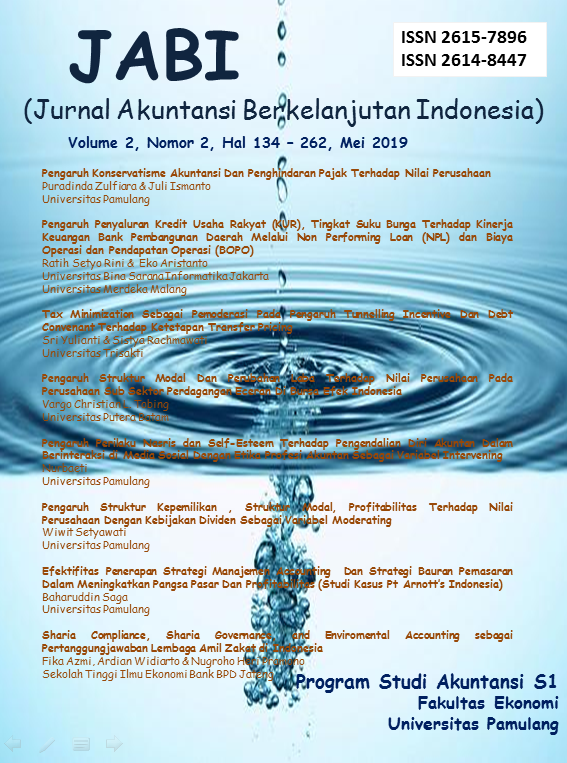Peran Struktur Tata Kelola dalam Mencegah Kecurangan Internal di Perbankan Indonesia
Keywords:
banking, committee audit, committee risk management, good governance, internal fraud, risk managementAbstract
The banking industry is an industry that has the most vulnerable impact on fraud. Internal fraud committed by the internal banking parties can have a impact on reputation of the banking bank itself. the purpose of this research is to examine the components of the banking management structure which consists of independent audit committees, risk management committees, audit audits of internal audit work units, and the size of the company's internal fraud. The population in this study were all banks in Indonesia from 2020 and 2021. The sample obtained in this study was 61 banks. The testing technique in this study is to use multiple regression analysis. The results showed that the independent audit committee and the Risk Management Committee had no effect on internal fraud. Whereas audit examination of internal audit work units and company size affects internal fraud. The test results show that banks must pay attention to the structure of corporate governance, especially the internal audit work unit and company size in terms of management to reduce the possibility of internal fraud.
References
Agwu, M. E. (2014). Reputational risk impact of internal frauds on bank customers in Nigeria. International Journal of Development and Management Review, 9(1), 175-192.
Ali, O. M., & Nesrine, A. (2015). Factors affecting auditor independence in Tunisia: the perceptions of financial analysts. Journal of Finance and Accounting, 3(3), 42-49.
Anugerah, R. (2014). Peranan good corporate governance dalam pencegahan fraud. Jurnal Akuntansi, 3(1), 101-113.
Fitriyani, F., & Noviyanti, S. (2021). Pengaruh Ukuran Perusahaan, Kualitas, Dan Independensi Komite Audit Terhadap Kecurangan Pelaporan Keuangan Pada Perusahaan BEI. COSTING: Journal of Economic, Business and Accounting, 5(1), 738-754.
Free, C., & Murphy, P. R. (2015). The ties that bind: The decision to coâ€offend in fraud. Contemporary Accounting Research, 32(1), 18-54.
Handoko, B. L., & Ramadhani, K. A. (2017). Pengaruh Karakteristik Komite Audit, Keahlian Keuangan Dan Ukuran Perusahaan Terhadap Kemungkinan Kecurangan Laporan Keuangan [The Influence of Audit Committee Characteristics, Financial Expertise, and Company Size toward the Possibility of Financial Report Fraud]. DeReMa (Development Research of Management): Jurnal Manajemen, 12(1), 86-113.
Hartanto, R., Lasmanah, L., & Purnamasari, P. (2020). How Does the Good Corporate Governance Prevent the Internal Fraud in Banks? 2nd Social and Humaniora Research Symposium (SoRes 2019),
Jans, M., Lybaert, N., & Vanhoof, K. (2010). Internal fraud risk reduction: Results of a data mining case study. International Journal of Accounting Information Systems, 11(1), 17-41.
Johnson, W. C., Xie, W., & Yi, S. (2014). Corporate fraud and the value of reputations in the product market. Journal of Corporate Finance, 25, 16-39.
Kusumaningsih, K. U., & Wirajaya, I. G. A. (2017). Faktor-Faktor Yang Mempengaruhi Tindak Kecurangan Di Perusahaan Perbankan. E-Jurnal Akuntansi, 19(3), 1832-1860.
Laming, R. F., Setiawan, A., & Saleh, H. (2019). The Effect of whistleblowing Hotline, Surprise audit, and the independence of Audit Committee on internal Fraud: Facts of Banking Companies in Indonesia. International Journal of Advanced Engineering Research and Science, 6(12), 401-406.
Madawaki, A., & Amran, N. A. (2013). Audit committees: How they affect financial reporting in Nigerian companies. Journal of Modern Accounting and Auditing, 9(8), 1070.
Meliala, C. C. D. B. S. (2018). Pengaruh Karakteristik Komite Audit dan Perusahaan Terhadap Kecurangan Pelaporan Keuangan Pada Perusahaan Manufaktur di Bursa Efek Indonesia (Periode 2013-2016) STIE YKPN].
Peters, S., & Maniam, B. (2016). Corporate fraud and employee theft: Impacts and costs on business. Journal of Business and Behavioral Sciences, 28(2), 104.
Pomeroy, B., & Thornton, D. B. (2008). Meta-analysis and the accounting literature: The case of audit committee independence and financial reporting quality. European Accounting Review, 17(2), 305-330.
Pramana, Y., Suprasto, H. B., Putri, I. G. A. M. D., & Budiasih, I. G. A. N. (2019). Fraud factors of financial statements on construction industry in Indonesia stock exchange. International Journal of Social Sciences and Humanities, 3(2), 187-196.
Ruspantini, D., & Sordi, A. (2011). The reputational risk impact of internal frauds on bank customers: a case study on UniCredit Group. Unicredit&Universities, Knight of Labor Ugo Foscolo Foundation: Milan, Italy.
Shankaraiah, K., & Amiri, S. M. S. (2017). Audit committee quality and financial reporting quality: A study of selected Indian companies. Journal of Accounting and Business Dynamics, 4(1), 1-18.
Singleton, T. W., & Singleton, A. J. (2010). Fraud auditing and forensic accounting (Vol. 11). John Wiley & Sons.
Sudarmanto, E. (2020). Manajemen Risiko: Deteksi Dini Upaya Pencegahan Fraud. Jurnal Ilmu Manajemen, 9(2), 107-121.
Teguh, K. M., & Kristanto, A. B. (2020). Company Characteristics and the Tendency of Fraudulent Financial Reporting. Jurnal Akuntansi Bisnis, 13(2).
Downloads
Published
Issue
Section
License
Copyright (c) 2024 Rudy Hartanto, Edi Sukarmanto, Dwi Rahayu, Asti Tazkiatul Aulia, Nadiya Dwi Puspita

This work is licensed under a Creative Commons Attribution 4.0 International License.
Authors who publish with this journal agree to the following terms:
- Authors retain copyright and grant the journal right of first publication with the work simultaneously licensed under a Creative Commons Attribution License that allows others to share the work with an acknowledgement of the work's authorship and initial publication in this journal.
- Authors are able to enter into separate, additional contractual arrangements for the non-exclusive distribution of the journal's published version of the work (e.g., post it to an institutional repository or publish it in a book), with an acknowledgement of its initial publication in this journal.
- Authors are permitted and encouraged to post their work online (e.g., in institutional repositories or on their website) prior to and during the submission process, as it can lead to productive exchanges, as well as earlier and greater citation of published work (See The Effect of Open Access)

This work is licensed under a Creative Commons Attribution-ShareAlike 4.0 International License.


 PUBLICATION ETHICS
PUBLICATION ETHICS FOCUS AND SCOPE
FOCUS AND SCOPE EDITORIAL TEAM
EDITORIAL TEAM REVIEW PROCESS
REVIEW PROCESS CONTACT US
CONTACT US AUTHOR GUIDELINES
AUTHOR GUIDELINES




